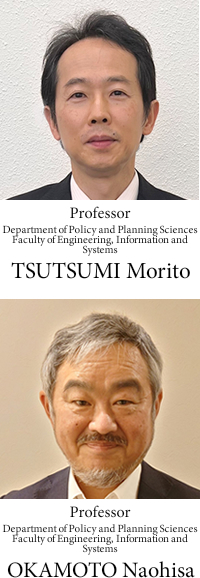Message from the Chair (April 1, 2022)

The University of Tsukuba, now in its 40th year, looks forward to the coming 40 years with a new start in April 2014. Founded on ideals developed over the past 40 years, TPPS (Tsukuba's Policy and Planning Sciences) graduate programs begin engraving new history.
From its inception, we have emphasized an interdisciplinary approach to the challenge of analyzing and solving the wide variety of issues facing modern society using objective, quantitative methods. Thus, the educational mission of TPPS is to foster deep social expertise, rational analytical orientation, and engineering skills capable of addressing society's problems in professionals who are both richly humane and possess broad vision.
The reorganization of our curriculum brings out the special nature of TPPS. Taking advantage of the scale of our faculty, it embodies a flexible teaching and research organization that quickly responds to new problems with timely solutions. Even more important, the introduction of the new “degree program” structure consolidates our graduate program into just two courses. This concept dissolves limitations to the boundaries of narrow academic specialties, and emphasizes our commitment to the original educational ideal of TPPS: open and innovative solutions for the varied requirements of our modern society. As our society progresses, TPPS will evolve as well.
The History of TPPS
| 1973 | Opening of the University of Tsukuba. |
|---|---|
| 1976 | The Graduate Program was founded as the Program in Business Administration and Public Policy. As an independent Master Program, the Program focused on scientific analysis of problems in policy science and business management posed by both the public and private sectors. It aimed to educate high-level professional specialists able to propose solutions to policy problems. It became known as the first program of its kind in Japan. |
| 1977 | The undergraduate arm of the department was founded as the College of Policy and Planning Sciences. |
| 1978 | The research arm of the department was founded as the Doctoral Program in Social Engineering, a 5-year program leading directly to the Ph.D. It was composed of three majors, Metrics and Planning, Management Engineering, and Urban and Regional Planning. |
| 1994 | The Graduate Program in Urban and Regional Planning was founded as an associated Graduate School. |
| 1997 | The Graduate Program was reorganized into four majors, Socioeconomic Systems, Systems and Information Mathematics, Urban and Environmental Systems, and Finance Metrics and Management. |
| 2000 | The Doctoral Program became one component of the Graduate School of Systems and Information Engineering, consolidating into two programs, in Social Systems Engineering and Finance Metrics and Management. The Social Systems Engineering Program was composed of three fields, Socioeconomic Systems, Systems and Information Mathematics, and Urban and Environmental Systems. |
| 2001 | Within the Master Program in Business Administration and Public Policy, the fields were reorganized into four fields, MBA, Applied Mathematics for Business Analysis and IT, Socio-Economic Systems, and Urban Planning. |
| 2005 |
The five-year Doctoral Programs were reorganized into a two-year “First Term” (Master) Graduate Program followed by a three-year “Second Term” (Doctoral) Graduate Program. At this time the fields in Social Systems Engineering and Finance Metrics and Management were consolidated into the first-term Social Systems Engineering Program, while the doctoral programs were reorganized as the second-term Social Systems Management Program. The Social Systems Engineering Program was composed of fields in Socioeconomic Systems, Systems and Information Mathematics, Urban and Environmental Systems, and Finance Metrics and Management. At the same time the Master's Program in Business Administration and Public Policy was added to the Graduate School of Systems and Information Engineering as a separate program, offering separate courses leading to the MBA and MPP degrees. |
| 2006 | The Program in Social Systems Engineering was reorganized into the fields of Socioeconomic Systems, Management Science and Urban Planning. |
| 2007 | The Third Cluster of Colleges was reorganized as the School of Science and Engineering, and the College of Policy and Planning Sciences joined the new school. |
| 2013 | As the University of Tsukuba greeted its 40th year of operation, the previously separate fields of the Graduate Program in Policy and Planning Sciences implemented a plan to reorganize as a single interdisciplinary department. |
| 2014 | The “Department of Policy and Planning Sciences” opens its doors to the first class of a new breed of planners and managers. |
| 2020 | Our department evolves more independent degree programs; the Policy and Planning Sciences and the Service Engineering. |


